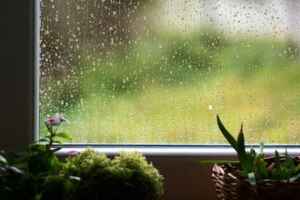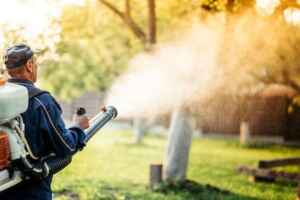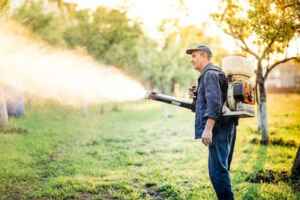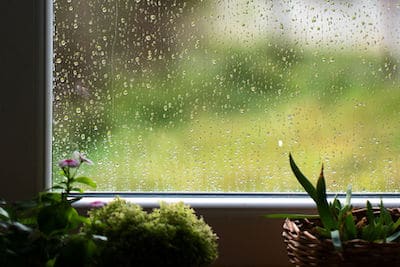When spending a lot of money on treating a pest infestation, it’s easy to see why a lot of people want to make sure their investment isn’t being washed away when it rains right after or during a treatment.
The last thing you want is to spend all of that money only to find that those unwelcome insects are still hanging out in your home.
If you are concerned about this, you aren’t alone. Can pest control be done in the rain?
Thankfully, manufacturers can develop products that are resistant to rain and can hold up no matter what the season or weather conditions are. However, having around 20 – 30 minutes with dry conditions is ideal because it ensures that the treatment will be as effective as possible. When it comes down to it, even if it rains, pest control is still a viable and effective solution for getting rid of the pests in or around your home.
 How Pest Control Treatments Respond To Rain
How Pest Control Treatments Respond To Rain
So how exactly do these kinds of pest control treatments respond to rainfall, and how is it still a viable solution? Here is a brief look at some of the practical ways pest control is affected during bad weather:
How Rain Affects Pest Control Indoors —
It’s obvious to say that the inside of your home stays nice and dry despite any rainy weather you are getting unless you are having some problems with the structural integrity of your home or have any moisture that has accumulated.
If this is the case, the homeowners must do what needs to be done to ensure that these problems are address, and other precautions are put into place.
If you are worried about any damages to your home or any openings that haven’t been treated, pest control is a great way to make sure that these entry points or damaged areas are spotted, and then taken care of before any treatment is administered.
How Rain Affects Pest Control Outdoors —
 Pest control treatment isn’t heavily affected in the outdoors and can be carried out quite normally with the same impact if not more.
Pest control treatment isn’t heavily affected in the outdoors and can be carried out quite normally with the same impact if not more.
Despite what one would think, some pest control treatments that are used outside can be more effective after rainfall than before. A treatment that is sometimes used for pest control is administered by distributing pellets that are activated by moisture.
The chemicals that are in the pellets will dissolve when they encounter moisture and be absorbed by the soil underneath them. If there are concentrated amounts of pests who reside in the soil, they will most certainly be exterminated.
Pest control companies are quite accustomed to using these kinds of methods that sometimes require them to be done during rainfall.
Even though pest control can still be effective in wet conditions, it doesn’t mean that you won’t face some challenges from time to time in the process.
Challenges Of Pest Control In The Rain
Rain can cause more challenges than you would think when trying to figure out a suitable solution for pest control. It has an impact on us as a pest control business, but it can also affect how the bug themselves behave. Here are some of the challenges that arise with pest control as a result of rain.
Pests Will Try To Get To Higher Ground —
When it rains, you might have started noticing that the bugs come out of the ground when it’s wet, and there is a pretty basic reason for that. When there is precipitation, the cracks, and holes that the bugs normally call home to become filled with rainwater which makes them inhabitable.
If the bugs stayed in this environment in the rain, they would die pretty quickly, but instead, their survival instincts cause them to climb upward as much as possible. This usually places them somewhere on or near your home.
It’s because of this that you are sometimes able to see not one, or two but hundreds of insects after a long and rainy day. Until they are sure that the ground is dry again, they are content staying above ground which eventually causes infestation problems.
Pests Will Take Refuge In Your Home —
Once these bugs decide to leave their flooded homes, it means that you have a lot more to worry about when it comes to them finding a way into your home. While bugs that are underground definitely want to find refuge in your home, there might be some pests that live above ground who are also seeking out shelter from the rain.
Just like us humans, bugs do not like getting wet. This causes them to dash the nearest dry places that they can find whenever the rain starts to fall.
You are much more likely to see problems like this arise in the summertime because of the heavier rainfall that occurs. In the summer, there are more bugs in general, which means that you have more chances of getting an infestation.
Rain Creates Entry Points For Pests —
When it rains, cockroaches, ants, termites, pillbugs, ticks, mosquitos, centipedes, sowbugs and even rodents will be tempted to find a way to get into your home or place of business to get somewhere dry.
Unfortunately, when it rains heavily, it can cause damage or even further damage to certain sections of your residence that opens up holes, cracks and other entry points that pests can get into. Utilizing products like roof cement can help close entry points in your home and allow you to prevent damage from pests.
Because most of these pests are so small, the entry point doesn’t need to be very large for them to successfully find their way inside. If there is a way to get in, pests can find it.
Rain Encourages The Breeding Of More Pests —
If you are residing in a place where it rains a substantial amount, your home may be susceptible to more infestations of insects or rodents because of how quickly pests can reproduce during the wetter seasons.
Any still or stagnate water that has accumulated as a result of heavy rain is the perfect place for pests like mosquitoes to breed. Because mosquitos can carry dangerous and contagious diseases, this is something you want to take seriously.
4 Tips For Optimizing Your Home For Pest Control Before It Rains
1. Before It Rains, Inspect Your Surroundings
It’s always a good idea to take a look at your surroundings before heavy rainfall occurs. Do you notice any places where water can pool up? How about any ground that is uneven that would keep water from draining the way that it’s supposed to?
Making sure everything can drain properly around your home is very important when preparing for a storm. When you take time to clear debris for proper draining, you are getting rid of potential homes for pests like termites and ants to hide.
2. Before It Rains, Weatherproof Your Home
Another thing you can do to prepare your home for rain is to make sure that it is weatherproofed. Weatherstripping is very important no matter what season it is because it gives you better insulation and even helps with reducing the cost of your energy usage.
In addition to that, making sure that you fill gaps, cracks, holes and any leaks will make sure that pests don’t have any points of access to get into your home. Keeping pests out will always be much easier than trying to force them out or even exterminating them.
Because there will always be rain, it is always important that these vulnerabilities are constantly addressed.
3. Before It Rains, Damp Proof Your Home
Before it rains, you want to be certain that your home is damp proof. Even if all of the ground around your home gets soaked from the rain, the foundation of your property needs to remain safe from moisture. Your floors, walls, and other structures in your house all need to be completely dry and stay that way.
If you have a home that has been exposed to moisture too long, you will find that it will become a refuge for all sorts of pests, but you can especially expect a visit from some termites. Dehumidifying your home might be a good idea if you are concerned that it has already been exposed to too much moisture.
4. Before It Rains, Check For Breeding Grounds
Unknowingly, there can be some places on or near your property that have become the breeding ground for pesky mosquitoes. Shaded and small standing areas of water can be the perfect place for these insects to breed if it is not addressed.
The place where the water is standing does not have to be big at all to be a problem. Mosquitos only need around an inch of water that is standing to lay their eggs in. Swings, gutters, pet water bowls, and bird feeders all need to be emptied and sanitized to avoid creating a nest for these pests.
If you are concerned about your home being exposed to too much moisture, or that you might have too many entry points for pests to penetrate your property, contact your local pest control company rain or shine!

